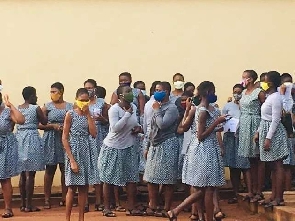Johannesburg (South Africa) -- Ashanti Goldfields says it is seeking merger and acquisition activity and has identified Gold Fields and a number of other South African, Canadian and one Australian company as entities with which it has had discussions in the past 12 months. Sam Jonah, Ashanti chief executive, said however that the company would only consider corporate action from "a position of strength" and was not driven to merge to avoid a crisis.
The company also says it is seeking to scrap the Ghanaian government's golden share, a veto which theoretically enables the state to block the disposal of Ashanti's assets or mining leases as well as the liquidation of the company.
Ashanti flirted with bankruptcy following the gold price run in 1999 when the group's exotic cocktail of derivatives left it with creditors demanding some $500 million. The company has spent the last two years retrieving its balance sheet, a process which culminated in an announcement last month to restructure $219 million in exchangeable notes scheduled to mature in the first quarter of 2003. The new structure sees Ashanti convert 25 percent of the current notes to equity at a market price of $3.70 a share with the balance exchanged for notes maturing in 2008. Jonah declares the market pleased with the new structure.
He now believes Ashanti has regained a firm footing and says the company would do a deal as soon as possible if it added value. The benefit of working with Gold Fields was its acquaintance with Ghanaian gold mining industry and the spread of quality assets, but the group was not wedded to a deal with the South African group. The much discussed golden share, a veto owned by the Ghanaian government which also owns about of fifth of Ashanti's equity, would not hinder the company from completing a deal, says Jonah.
Jonah's point is that the Ghanaian government was instrumental in listing Ashanti in 1994 and would therefore, as a responsible shareholder, not seek to block a deal which was value-adding: "The consequences for Ghana as a place of investment would be dire," he said, commenting on the possibility of government stepping in to block a deal. Ghana's government was more disposed to privatisation than the former owing to its private sector experience. "Ashanti is opportunistic and is waiting with sharpened teeth," Jonah said of Ashanti's new strategy.
A lesser known fact about Ashanti is that it has a history based on aggressive acquisition. Between 1994 and 1996, the company completed four acquisitions building its total production based from the single operation, Obuasi, which it owned at the time of listing. Acquisition remains a strategy for the future but one wonders if Ashanti's future lies exclusively in its own hands. About a third of Ashanti is owned by Lonmin, which has declared its intention to sell its stake at the right value. This would make Ashanti vulnerable to a hostile or friendly takeover proposal, a possibility which Jonah concedes. The tacit agreement is that if Lonmin receives an offer for its Ashanti shares it will first discuss the matter with the Ghanaians.
Meantime, Jonah dismisses any chance of the company selling its 50 percent holding in the Geita gold mine to its joint venture partner, AngloGold. The South African gold company is thought to be seeking buying up shares in joint ventures it does not own (the other is Morila which is owned in cooperation with Randgold Resources). Jonah said the golden share could be exercised if the company made "a material disposal of assets" and "we have no intention to sell any assets," Jonah said earlier in a presentation at the Indaba mining conference, held in Cape Town.
Business News of Wednesday, 13 February 2002
Source: Miningweb












